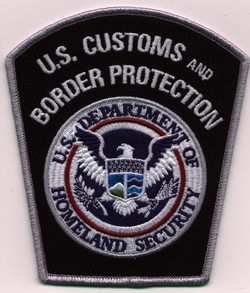Mon, Feb 01, 2010
Accurate Manifests And Security Screening Are Still Critical To
Safety
 US Customs and Border Protection
(CBP) and DHS have issued a letter to the Biz Av community
reminding pilots that all passengers coming to the United States
must be screened prior to boarding, even those being evacuated from
Haiti. The letter specifically points out the need to
properly document children that are being taken out of the country
for adoption.
US Customs and Border Protection
(CBP) and DHS have issued a letter to the Biz Av community
reminding pilots that all passengers coming to the United States
must be screened prior to boarding, even those being evacuated from
Haiti. The letter specifically points out the need to
properly document children that are being taken out of the country
for adoption.
In light of the extraordinary circumstances that now exist in
Haiti, CBP and DHS are writing to remind pilots of private aircraft
of the obligations that exist to screen all passengers prior to
boarding flights to the United States. As defined in CFR Title 19,
pilots of private aircraft are required to electronically transmit
passenger and crew manifest information for all flights arriving in
to or departing from the United States. Pilots of private aircraft
are also obliged to take reasonable steps to prevent the boarding
of improperly documented aliens at Toussaint Louveture
International Airport in Port-au-Prince, Haiti and any other ports
of embarkation in Haiti as well as third countries.
As part of the U.S. government’s ongoing support of
international recovery efforts after last week’s earthquake,
CBP is taking every step possible to ensure proper screening
procedures are followed to protect the safety and well-being of
children impacted by the earthquake in Haiti.
Appropriate screening for unaccompanied children will help
identify and protect victims of human trafficking as well as ensure
the integrity of the adoption process.
 United States
Citizens
United States
Citizens
- At this time, the Department of State is providing travel or
boarding letters or printouts of passport information for citizens
of the United States not in possession of a United States passport
where possible.
- Pilots must take steps to include confirmation that the
traveler bears a valid United States passport or other documentary
proof of United States citizenship provided by United States
government agencies. Pilots shall confirm that the traveler bears a
valid United States passport or other documentary proof of United
States citizenship provided by United States government agencies
working in Haiti or a third country.
Non-U.S. Citizens
- Pilots are obliged to take reasonable steps to prevent the
boarding of improperly documented aliens at Toussaint Louveture
International Airport in Port-au-Prince, Haiti and any other ports
of embarkation in Haiti or from a third country.
- Pilots are responsible to verify that the bearer is the
rightful holder of the document(s) presented and that the
document(s) are valid for entry into the United States.
- Non-U.S. citizens must be in possession of an appropriate
travel/boarding document or otherwise cleared with the Department
of Homeland Security to allow boarding.
- Pilots must ensure screening of passengers prior to boarding
and examination of their travel documents to ensure that, in the
case of aliens, the passport/travel document is valid for entry
into the United States and that the bearer is the rightful holder
and is in possession of a visa, if required.
- Documentation includes visa, boarding letter, advance parole,
evidence of urgent humanitarian parole for medivac or other
emergent reasons.
- If appropriate documentation for entry to the United States is
not in an alien’s possession, pilots should not board him/her
for flights bound for the United States.
- In the event that a pilot determines that an alien seeking to
board a flight bound for the United States is not properly
documented, the pilot is obliged to refuse to board him/her.
- Although DHS may use discretion to mitigate/waive, on a case by
case basis, penalties associated with INA section 273(a)(1) for
“bringing an alien without a valid unexpired entry
document,” it is critical that pilots continue to conduct
their screening responsibilities to ensure aviation security, the
safety of travelers, and security of U.S. borders is not
compromised.

This screening requirement is, under existing regulations and
policies, in addition to the requirement that pilots of private
aircraft must electronically transmit passenger and crew manifest
information, including Advanced Passenger Information System (APIS)
data for all flights between the United States and Haiti, or into
the United States from a third country where the flights or
passengers are participating in relief or other transportation
efforts related to the earthquake in Haiti. Consistent with
existing procedures, pilots of private aircraft must notify the
port of arrival in the event that extenuating circumstances prevent
the pilot from providing the required manifest information.
APIS Requirements
- Pilots of private aircraft are required to electronically
transmit passenger and crew manifest information, pursuant to 19
CFR 122.22, for all flights arriving in to or departing from the
United States.
- Under extenuating or emergent situations, pilots of private
aircraft should make every effort to transmit complete APIS
information to allow for advance screening and to facilitate the
processing of travelers arriving in to or departing from the United
States.
- CBP has procedures in place to accommodate private aircraft
pilots that cannot transmit APIS due to circumstances beyond their
means.
- The private aircraft pilot must notify the port of arrival of
the extenuating circumstances or the system failure and identify
the affected flight(s).
For specific questions regarding APIS
for private aircraft flights, please email Private.Aircraft.Support@dhs.gov
Permission to Land and Landing Rights
Requirements
- Prior to departure from the foreign port or place, the pilot of
a private aircraft must receive an electronic clearance message
from DHS approving departure for the United States, and follow any
instructions contained therein prior to departure.
- Pilots of private aircraft are reminded to carry out all
instructions contained in the electronic clearance message, which
may include a requirement to contact the CBP port of arrival to
obtain permission to land or landing rights.
- Once DHS has approved departure, and the pilot of the private
aircraft has executed all instructions issued by DHS, the aircraft
is free to depart with the intent of landing at the designated U.S.
port of entry.
More News
“While legendary World War II aircraft such as the Corsair and P-51 Mustang still were widely flown at the start of the Korean War in 1950, a new age of jets rapidly came to >[...]
Decision Altitude (DA) A specified altitude (mean sea level (MSL)) on an instrument approach procedure (ILS, GLS, vertically guided RNAV) at which the pilot must decide whether to >[...]
Aero Linx: National Aviation Safety Foundation (NASF) The National Aviation Safety Foundation is a support group whose objective is to enhance aviation safety through educational p>[...]
Also: Cal Poly Aviation Club, $$un Country, Arkansas Aviation Academy, Teamsters Local 2118 In response to two recent general aviation accidents that made national headlines, more >[...]
“The FAA is tasked with ensuring our skies are safe, and they do a great job at it, but there is something about the system that is holding up the medical process. Obviously,>[...]
 Aero-News: Quote of the Day (04.28.25)
Aero-News: Quote of the Day (04.28.25) ANN's Daily Aero-Term (04.28.25): Decision Altitude (DA)
ANN's Daily Aero-Term (04.28.25): Decision Altitude (DA) ANN's Daily Aero-Linx (04.28.25)
ANN's Daily Aero-Linx (04.28.25) Airborne-Flight Training 04.24.25: GA Refocused, Seminole/Epic, WestJet v TFWP
Airborne-Flight Training 04.24.25: GA Refocused, Seminole/Epic, WestJet v TFWP Aero-News: Quote of the Day (04.29.25)
Aero-News: Quote of the Day (04.29.25)





